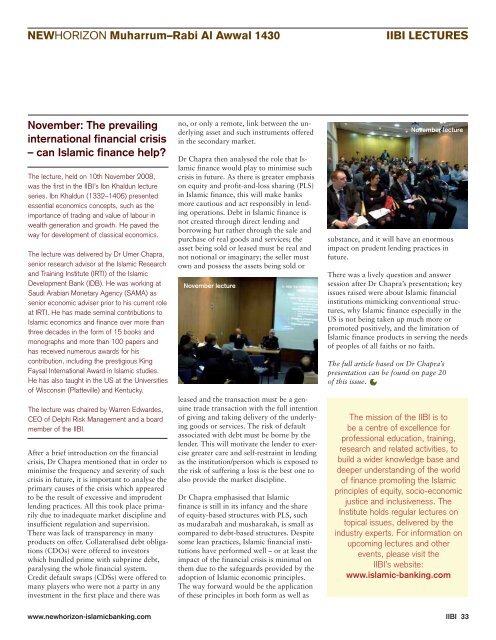the global financial crisis: can islamic finance help? - Institute of ...
the global financial crisis: can islamic finance help? - Institute of ...
the global financial crisis: can islamic finance help? - Institute of ...
- No tags were found...
You also want an ePaper? Increase the reach of your titles
YUMPU automatically turns print PDFs into web optimized ePapers that Google loves.
NEWHORIZON Muharrum–Rabi Al Awwal 1430<br />
IIBI LECTURES<br />
November: The prevailing<br />
international <strong>financial</strong> <strong>crisis</strong><br />
– <strong>can</strong> Islamic <strong>finance</strong> <strong>help</strong>?<br />
The lecture, held on 10th November 2008,<br />
was <strong>the</strong> first in <strong>the</strong> IIBI’s Ibn Khaldun lecture<br />
series. Ibn Khaldun (1332–1406) presented<br />
essential economics concepts, such as <strong>the</strong><br />
importance <strong>of</strong> trading and value <strong>of</strong> labour in<br />
wealth generation and growth. He paved <strong>the</strong><br />
way for development <strong>of</strong> classical economics.<br />
The lecture was delivered by Dr Umer Chapra,<br />
senior research advisor at <strong>the</strong> Islamic Research<br />
and Training <strong>Institute</strong> (IRTI) <strong>of</strong> <strong>the</strong> Islamic<br />
Development Bank (IDB). He was working at<br />
Saudi Arabian Monetary Agency (SAMA) as<br />
senior economic adviser prior to his current role<br />
at IRTI. He has made seminal contributions to<br />
Islamic economics and <strong>finance</strong> over more than<br />
three decades in <strong>the</strong> form <strong>of</strong> 15 books and<br />
monographs and more than 100 papers and<br />
has received numerous awards for his<br />
contribution, including <strong>the</strong> prestigious King<br />
Faysal International Award in Islamic studies.<br />
He has also taught in <strong>the</strong> US at <strong>the</strong> Universities<br />
<strong>of</strong> Wisconsin (Platteville) and Kentucky.<br />
The lecture was chaired by Warren Edwardes,<br />
CEO <strong>of</strong> Delphi Risk Management and a board<br />
member <strong>of</strong> <strong>the</strong> IIBI.<br />
After a brief introduction on <strong>the</strong> <strong>financial</strong><br />
<strong>crisis</strong>, Dr Chapra mentioned that in order to<br />
minimise <strong>the</strong> frequency and severity <strong>of</strong> such<br />
<strong>crisis</strong> in future, it is important to analyse <strong>the</strong><br />
primary causes <strong>of</strong> <strong>the</strong> <strong>crisis</strong> which appeared<br />
to be <strong>the</strong> result <strong>of</strong> excessive and imprudent<br />
lending practices. All this took place primarily<br />
due to inadequate market discipline and<br />
insufficient regulation and supervision.<br />
There was lack <strong>of</strong> transparency in many<br />
products on <strong>of</strong>fer. Collateralised debt obligations<br />
(CDOs) were <strong>of</strong>fered to investors<br />
which bundled prime with subprime debt,<br />
paralysing <strong>the</strong> whole <strong>financial</strong> system.<br />
Credit default swaps (CDSs) were <strong>of</strong>fered to<br />
many players who were not a party in any<br />
investment in <strong>the</strong> first place and <strong>the</strong>re was<br />
no, or only a remote, link between <strong>the</strong> underlying<br />
asset and such instruments <strong>of</strong>fered<br />
in <strong>the</strong> secondary market.<br />
Dr Chapra <strong>the</strong>n analysed <strong>the</strong> role that Islamic<br />
<strong>finance</strong> would play to minimise such<br />
<strong>crisis</strong> in future. As <strong>the</strong>re is greater emphasis<br />
on equity and pr<strong>of</strong>it-and-loss sharing (PLS)<br />
in Islamic <strong>finance</strong>, this will make banks<br />
more cautious and act responsibly in lending<br />
operations. Debt in Islamic <strong>finance</strong> is<br />
not created through direct lending and<br />
borrowing but ra<strong>the</strong>r through <strong>the</strong> sale and<br />
purchase <strong>of</strong> real goods and services; <strong>the</strong><br />
asset being sold or leased must be real and<br />
not notional or imaginary; <strong>the</strong> seller must<br />
own and possess <strong>the</strong> assets being sold or<br />
November lecture<br />
leased and <strong>the</strong> transaction must be a genuine<br />
trade transaction with <strong>the</strong> full intention<br />
<strong>of</strong> giving and taking delivery <strong>of</strong> <strong>the</strong> underlying<br />
goods or services. The risk <strong>of</strong> default<br />
associated with debt must be borne by <strong>the</strong><br />
lender. This will motivate <strong>the</strong> lender to exercise<br />
greater care and self-restraint in lending<br />
as <strong>the</strong> institution/person which is exposed to<br />
<strong>the</strong> risk <strong>of</strong> suffering a loss is <strong>the</strong> best one to<br />
also provide <strong>the</strong> market discipline.<br />
Dr Chapra emphasised that Islamic<br />
<strong>finance</strong> is still in its infancy and <strong>the</strong> share<br />
<strong>of</strong> equity-based structures with PLS, such<br />
as mudarabah and musharakah, is small as<br />
compared to debt-based structures. Despite<br />
some lean practices, Islamic <strong>financial</strong> institutions<br />
have performed well – or at least <strong>the</strong><br />
impact <strong>of</strong> <strong>the</strong> <strong>financial</strong> <strong>crisis</strong> is minimal on<br />
<strong>the</strong>m due to <strong>the</strong> safeguards provided by <strong>the</strong><br />
adoption <strong>of</strong> Islamic economic principles.<br />
The way forward would be <strong>the</strong> application<br />
<strong>of</strong> <strong>the</strong>se principles in both form as well as<br />
November lecture<br />
substance, and it will have an enormous<br />
impact on prudent lending practices in<br />
future.<br />
There was a lively question and answer<br />
session after Dr Chapra’s presentation; key<br />
issues raised were about Islamic <strong>financial</strong><br />
institutions mimicking conventional structures,<br />
why Islamic <strong>finance</strong> especially in <strong>the</strong><br />
US is not being taken up much more or<br />
promoted positively, and <strong>the</strong> limitation <strong>of</strong><br />
Islamic <strong>finance</strong> products in serving <strong>the</strong> needs<br />
<strong>of</strong> peoples <strong>of</strong> all faiths or no faith.<br />
The full article based on Dr Chapra’s<br />
presentation <strong>can</strong> be found on page 20<br />
<strong>of</strong> this issue.<br />
The mission <strong>of</strong> <strong>the</strong> IIBI is to<br />
be a centre <strong>of</strong> excellence for<br />
pr<strong>of</strong>essional education, training,<br />
research and related activities, to<br />
build a wider knowledge base and<br />
deeper understanding <strong>of</strong> <strong>the</strong> world<br />
<strong>of</strong> <strong>finance</strong> promoting <strong>the</strong> Islamic<br />
principles <strong>of</strong> equity, socio-economic<br />
justice and inclusiveness. The<br />
<strong>Institute</strong> holds regular lectures on<br />
topical issues, delivered by <strong>the</strong><br />
industry experts. For information on<br />
upcoming lectures and o<strong>the</strong>r<br />
events, please visit <strong>the</strong><br />
IIBI’s website:<br />
www.<strong>islamic</strong>-banking.com<br />
www.newhorizon-<strong>islamic</strong>banking.com<br />
IIBI 33
















